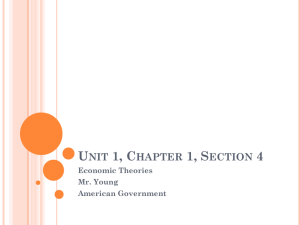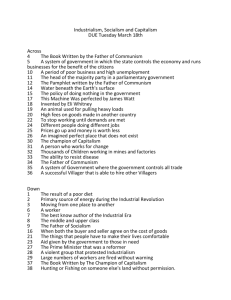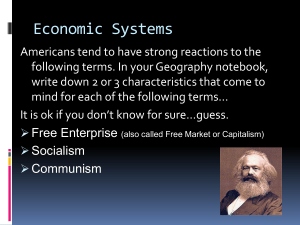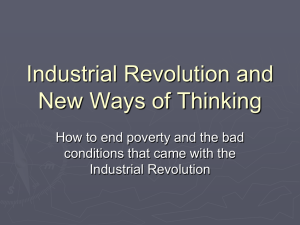Communism vs. Socialism
advertisement
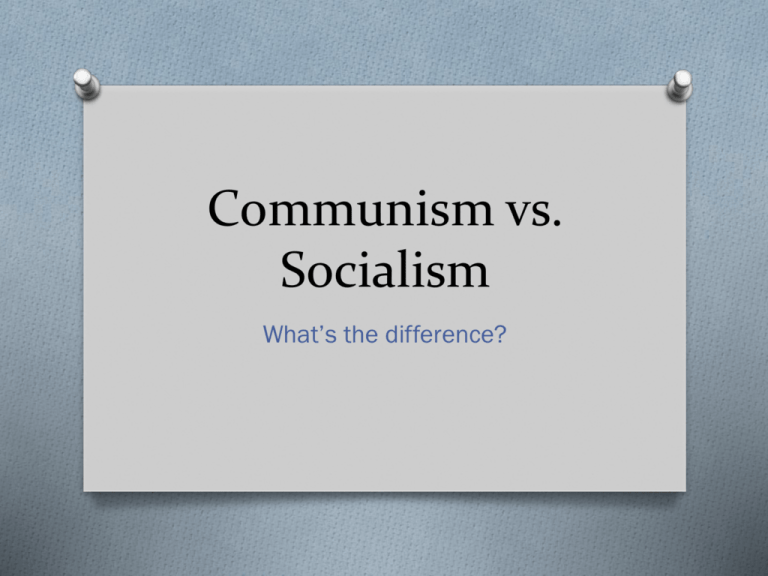
Communism vs. Socialism What’s the difference? Communism vs. Socialism O In a way, communism is an extreme form of socialism. O Many countries have dominant socialist political parties but very few are truly communist. O In fact, most countries have government programs that borrow from socialist principles Communism vs. Socialism O "Socialism" is sometimes used interchangeably with "communism" but the two philosophies have some stark differences. O Most notably, while communism is a political system, socialism is primarily an economic system that can exist in various forms under a wide range of political systems Communism Socialism From each according to his ability, to each according to his needs. Free-access to the articles Philosophy of consumption is made possible by advances in technology that allow for super-abundance. From each according to his ability, to each according to his contribution. Emphasis on profit being distributed among the society or workforce to complement individual wages/salaries. The means of production are held in common, negating the concept of ownership in capital goods. Production is Economic organized to provide for System human needs directly without any use for money. Communism is predicated upon a condition of material abundance. The means of production are owned by public enterprises or cooperatives, and individuals are compensated based on the principle of individual contribution. Production may variously be coordinated through either economic planning or markets. Communism Abolished - all religious Religion and metaphysics is rejected. All people are the same and therefore classes make no sense. The government should own all means of production Ideas and land and also everything else. People should work for the government and the collective output should be redistributed equally. Socialism Freedom of religion, but usually promotes secularism. All individuals should have access to basic articles of consumption and public goods to allow for selfactualization. Large-scale industries are collective efforts and thus the returns from these industries must benefit society as a whole. Communism Usually takes the form of totalitarianism as Marx Political described in The System Communist Manifesto. Cronyism common. Karl Marx, Fredrich Key Engels, Vladimir Lenin, Proponents Leon Trotsky. Socialism Can coexist with different political systems. Most socialists advocate participatory democracy, some (Social Democrats) advocate parliamentary democracy, and Marxist-Leninists advocate "Democratic centralism." Robert Owen, Pierre Leroux, Karl Marx, Fredrick Engels, John Stuart Mill, Albert Einstein, George Bernard Shaw, Thorstein Veblen, Emma Goldman. Communism Socialism Definition International theory or system of social organization based on the holding of all property in common, with actual ownership ascribed to the community or state. Rejection of free markets and extreme distrust of Capitalism in any form. A theory or system of social organization based on the holding of most property in common, with actual ownership ascribed to the workers. Economic coordination Economic planning coordinates all decisions regarding investment, production and resource allocation. Planning is done in terms of physical units instead of money. Planned-Socialism relies principally on planning to determine investment and production decisions. Planning may be centralized or decentralized. Market-socialism relies on markets for allocating capital to different socially-owned enterprises. Communism Socialism Social Structure All class distinctions are eliminated. Class distinctions are diminished. Private Property Abolished. The concept of property is negated and replaced with the concept of commons and ownership with "usership". Two kinds of property, personal property, such as houses, clothing, etc. owned by the individual. Public property includes factories, and means of production owned by the state but with worker control. Political movements Leninism, Trotskyism, Marxism-Leninism, Maoism, Left-Communism, Stalinism. Democratic Socialism, Communism, Libertarian Socialism, Anarchism, Syndicalism. Communism Either the collective "vote" or the state's rulers make Free Choice economic and political decisions for everyone else. Centralized government, planned economy, dictatorship of the "proletariat", common ownership of the tools of Key elements production, no private property. equality between genders and all people, international focus. antidemocratic. One party system. Socialism All choices, including education, religion, employment and marriage, are up to the individual. All health care and education is provided through a socialized system funded by taxation. Citizens have free and equal access. Economic activity and production especially are adjusted to meet human needs and economic demands. "Production for use": useful goods and services are produced specifically for their usefulness. Communism Socialism Government in a Communiststate is the agent of change rather than any market or desire on the part of Way of Change consumers. Change by government can be swift or slow, depending on change in ideology or even whim. Workers in a Socialist-state are the agent of change rather than any market or desire on the part of consumers. Change by the workers can be swift or slow, depending on change in ideology or even whim. In theory, all members of the Discrimination state are considered equal. The people are considered equal, laws are made when necessary to protect people from discrimination. Communism The means of production are commonly-owned, meaning Ownership no entity or individual owns structure productive property. Importance is ascribed to "usership" over "ownership". Ideally, there is no leader; the people govern directly. This has never been actually practiced, and has just used Examples a one-party system. Examples 0f Communist states are the erstwhile Soviet Union, Cuba and North Korea. Socialism The means of production are sociallyowned with the surplus value produced accruing to either all of society (in Publicownership models) or to all the employee-members of the enterprise (in Cooperative-ownership models). Union of Soviet Socialist Republics (USSR): Although the actual categorization of the USSR's economic system is in dispute, it is often considered to be a form of centrallyplanned socialism.



